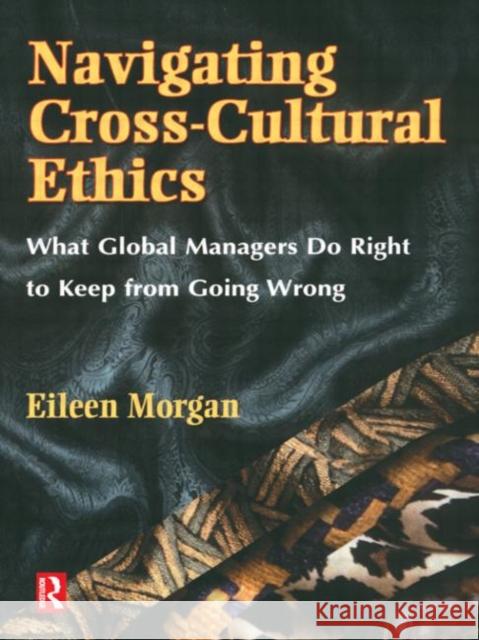Navigating Cross-Cultural Ethics » książka
Navigating Cross-Cultural Ethics
ISBN-13: 9780750699150 / Angielski / Miękka / 1998 / 216 str.
Navigating Cross-Cultural Ethics
ISBN-13: 9780750699150 / Angielski / Miękka / 1998 / 216 str.
(netto: 207,83 VAT: 5%)
Najniższa cena z 30 dni: 201,44 zł
ok. 16-18 dni roboczych.
Darmowa dostawa!
Through the personal stories of managers running global business, this book takes an inside look into the dilemmas of managers who are asked to make profits ethically according to the dictates of their company's ethics code. It examines what companies think" they are doing to help managers in those situations and how those managers are actually affected.
Thanks to the boost from the 1991 Sentencing Guidelines which minimizes penalties for companies with ethics codes caught in ethical wrongdoing, more than 85% of US companies and two thirds of all Canadian companies and half of all European companies now have Codes of Ethics. Yet, over and over, we hear of stories of personal dilemmas and conflicts experienced by individual managers navigating those business waters in other cultures.
"Eileen Morgan does an excellent job of mapping the course for navigating the previously uncharted global ethical waters. By identifying best practices, she leads the reader on a journey from Surviving, to Understanding to Knowing the ethical issues that frequently confront international business people. This is a must read for anyone who wants to successfully compete in world markets."
-Michael J. Litwin, Executive Vice President, Chief Credit Officer, Heller Financial, Inc.
"Eileen Morgan has combined the pragmatic concerns of the individual manager with the moral concerns that come from personal-life history, cultural roots, and corporate ethical culture ...This book focuses on the constructive task of formulating and using an "ethical map," and is sure to be a tonic to conscientious managers who want to navigate cross-cultural commercewith integrity. It has done a superb job of creating order out of the complexity of cross-cultural moral experience by insisting that the complexity must be honored and appropriated rather than ignored or suppressed."
-Dr. Richard Beauchamp, Professor of Ethics, Christopher Newport University
"In this groundbreaking book, Eileen Morgan has provided scores of real-life examples and developed a framework for approaching ethical leadership in international business. This is mandatory reading for anyone involved in global management today...This is an important book on an important subject."
-Stephen H. Rhinesmith, Ph.D. Author, A Manager's Guide to Globalization
"Eileen Morgan provides us with a much needed roadmap for how to walk the path of ethical leadership with practical feet. She reminds us that ethical decision-making is a critical aspect of every day leadership, and that we can all choose to be 'ethical pioneers' in our companies and our communities. Every leader engaged in global business can benefit from the lessons and stories included in this book."
-Christi A. Olson, Ph.D. Chair, Telecommunications Management Department,
Golden Gate University
"Eileen Morgan's thoughtful analysis of 'ethical capital' should be read by anyone who does business in a global environment...Morgan's book presents the issue clearly, comprehensively and compellingly, demonstrating that ethics is an indispensable aspect of individual leadership and organizational credibility. ...It provides a clear roadmap for business leaders who need to communicate their commitment to integrity and accountability to theiremployees, their partners, and their customer, making their 'ethical capital' one of their most valuable assets."
-Nell Minnow, Principal, Lens, The Corporate Governance Investors
"Eileen Morgan gives excellent insight into ethical practices. She focuses on business but her insights have general application. This book also describes differences in ethical interpretation that can arise between diverse cultures. Ms. Morgan has made an excellent contribution to understanding the benefit of positive ethical practices."
-David C. Lincoln, Sponsor, Lincoln Center for Applied Ethics, College of Business, Arizona State University; President, Arizona Oxides, LLC
?? First in-depth look at how managers in global companies actually bridge the gap between their organizations and their daily decisions
?? Explains the need for internal and external ethical operations??and how organizations often create confusion rather than clarity with the label of "ethics"











